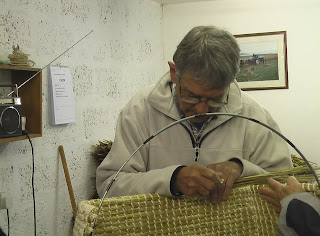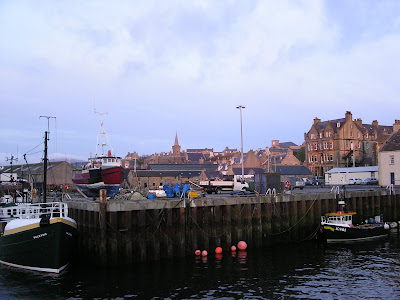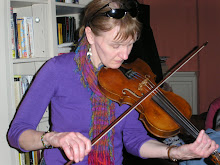 |
| Traditional Orkney Chair construction |
You can't be in Orkney without spying old or new Orkney chairs. Locals made
these chairs for hundreds of years with materials they had at hand and driftwood washed up onto the western shores of the islands. The chairs
combine wood for the frame and oat straw coiled and stitched with
sisal for the chair backs. We saw the chairs being made first hand at Jackie
and Marlene Miller’s workshop, Scapa Crafts in Kirkwall.
http://www.scapacrafts.co.uk/
 |
| Jackie Miller, chair maker |
Jackie works with a joiner who makes the wooden part of the chair from
driftwood, usually pine or beech, or oak or walnut. The oatstraw has to be cut
with an old fashioned binder.
 |
| Tools of the trade |
It takes 4 sheaves for one chair back and more
for a hooded chair like this. Each stalk in the sheaf is stripped by hand by
Marlene. Jackie carries on a tradition
learned from his grandfather.
He has been making chairs for eighteen years full
time and always has another order to fill. He is one of 3 professional chair
makers on Orkney.
 |
| Robyn T. enjoying the comfort and warmth of an Orkney Chair |
The big island, or as Orcadians call “mainland” is home to numerous stone
circles and structures dating back as far as 5000 years. Nowadays, 17 of the 65
islands that are populated are home to 20,000 people, 100,000 beef cattle,
68,000 sheep and one fishing fleet, on Westray.
 |
| Standing Stones of Stenness |
We traveled west to the heart of Neolithic Orkney. Modern technology has
shown that the stone monuments above ground are just the tip of the iceberg of
all the ancient stone sites under the earth in this heart of the island. There
is currently a dig exploring a site found in 2009 not far from the Standing
Stones of Stenness.
http://www.orkneyjar.com/archaeology/nob2009award.htm
 |
| Doreen M. and Judy L. |
Stenness means
“stone point” and indeed the tall stones still standing are pointed on top, but
just 3100 years old. Also known as the Temple of Moon, couples came to perform
a marriage ritual which would bind them together for one year and one day.
After that period, they would have to come back to the stones to renew that
ritual or to break the contract. Thus was their system of “marriage in installments.”
On a clear day as both groups had, you can stand here and see the larger, Ring
of Brodgar in the close distance.
www.orkneyjar.com/history/standingstones/
 |
| One section of the Ring of Brodgar |
The Ring of Brodgar once had 60 stones standing. Brodgar means “farm by the
bridge.” A ditch, 11 feet deep and 33 feet wide encases the stone ring. One
story goes that giants came to this ground to dance. Hands joined, they danced
around and around, forming the ditch. They were having so much fun, they didn’t
notice the sun rising. When the sun’s rays touched them, they turned to stone,
thus forming the stones in the ring. Each Dec 31, they come alive, rise up out
of the ground, walk down to the lake and have a drink. Then they go back to the
ring and become solid stone for another year.
 |
| Textile enthusiasts as we are, notice the pattern, color, and texture of the lichen and rock surfaces |
The 2500 year old ring is said to grant the gift of
fertility to anyone who runs around it counter clockwise 3x without stopping.
Considering the large circumference, this running ritual also meant you were in
shape! As we walked the ring, some of us touching each stone, the wind blew us
along, urging us to consider what ancient wisdom moved the people to build such
impressive sites. What did they know, that we have long forgotten?
www.orkneyjar.com/history/brodgar/
 |
| Ring of Brodgar looking back towards Stenness |
Stromness is the 2nd largest town on mainland
Orkney with a population of 2000+. The narrow main street holds a variety of
shops and places to amuse the eye and entertain the mind. We especially like the
bookstore, Julia’s Bistro, the museum, and the Pier Art center. Take a walk through the street in pictures.
 |
| Northlight Tapestry Studio |
 |
Pier Art Center exhibits local art, currently showing the work of Jeremy Baster
 |
| and also international artists, a Barbara Hepworth sculpture at the Pier |
|
 |
| Pier Arts Centre is built right on the water front and a building design to bring the light and life of the town into the space |
 |
| The local museum has a fine exhibit of Hudson Bay Company artifacts |
 |
| I always looked forward to eating at Julia's |
Skara Brae was uncovered when a storm hit William Watt’s farm in 1850 and
eroded the beachfront. The settlement wasn’t excavated however to reveal what
we see today until 1928-30.
 |
| Skara Brae |
This stone-age community was
quite advanced as they even had a sewage system and a stone trough area they
filled with water and hot rocks to steam the sea life they ate. The laird’s
home, Skaill House, is also open for viewing.
 |
| Skaill House |
An excellent background of the area is presented at :
www.orkneyjar.com/history/skarabrae/
Today, an exciting archeological project is ongoing at the nearby Bay of Skaill
where a Viking long house was discovered in 2010.
http://www.conted.ox.ac.uk/research/projects/birsay-skaill/current_features_2011.pdf
 |
| Judy, Linda L., Linda Ru., and Evelyn observing simmon making |
Corrigall Farm Museum in Harray preserves the history
of agricultural life on the island. Implements, tools and household furnishings
from the 18th-20th century fill the buildings. You’ll find fascinating things like a simmon, rope that
was made from twining grass, a spoon kaise, for holding cutlery, an ingenious
mousetrap, an old Orkney chair, loom, and spinning tools. http://www.orkney.org/museums/
A tour of the Highland Park Distillery in Kirkwall takes you through the entire process of distilling single malt
whiskey from the malting of the barley to the where the magic happens in the
aging process. Highland Park single malt has a peaty taste and it light amber
in colour. The taste comes from the malting process of roasting the barley with
peat.
This is one of just five distilleries in Scotland that malts their own
barley. The barley comes from mainland Scotland. The barley is soaked in water
for two days, so it sprouts. Then it is spread out on a concrete floor for five
days and turned to prevent it from sticking together.
The kernels keep
germinating on the malting floor. Then the green malt is placed on a mesh floor
far above the fire kiln where it gets two firings of 18-20 hours each. The
first four layers of peat are used in the first firing to give the barley a
smokey flavor. Then it goes through a second firing fueled by coke, a form of
coal. This second firing dries the malted barley.
After malting the grain is turned into a mash. The mash goes through three
soakings. The distilling of the sugars into alcohol is a two-step process done
in huge copper cookers. They age the whisky a minimum of twelve years in both
Spanish sherry barrels.
Nothing like a dram of whisky to rejuvenate the weary travelers! http://
www.highlandpark.co.uk/distillery/
 |
| Jeanne, Geri, and Robyn, "tak a dram and we be cheery" |
Hazel and Jennifer Wrigley have traveled the world
performing traditional music since their teens. Now they focus their time in
Kirkwall running the The Reel Café, Bar, and Music School. The Reel has become the epicenter in Orkney
for music lessons taught by the sisters and others, and for sessions in
Kirkwall.
www.wrigleyandthereel.com
I attended the Saturday night session, a long running
tradition for over 20 years (not in the same pub). Two guitarists, a banjo player, and mouth organ player, members
of the local band “Hullion” were leading the session. The session was open to
any others who wanted to join in. I
heard many a fine Orcadian tune. The Orcadians are prolific tune makers and
especially love their polkas and slow airs. The songs in the Orcadian dialect
are sad or funny, or sometimes both!
There are two music festivals coming up on Orkney feature
local, Scottish, and international musicians alike.







































1 comment:
Another informative blog… Thank you for sharing it… Best of luck for further endeavor too.
Piano Lessons san mateo
Post a Comment